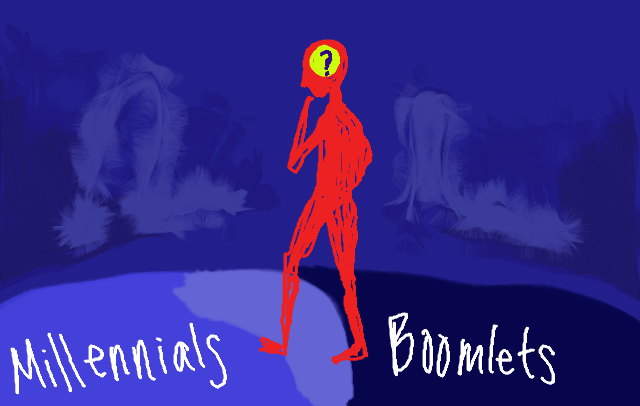As of now, there are six living generations in America (years are rough estimates, as the specific dates are widely disputed):
- The GI generation (“Greatest” Generation): born between 1901-1926
- The Mature/Silents: born between 1927-1945
- The Baby Boomers: born between 1946-1964
- Generation X: born between 1965-1980
- Generation Y (“Millennials”): born between 1981-2000
- Generation Z (“Boomlets”): born after 2000
It’s fair to say all are different, that some generations have been through war while others peace, some have embraced involvement while others passivity, some have been avidly hated (the Millennials, according to The Washington Post, Breitbart, The New York Post, and many other publications) while others loved. But in a world where these differences exist among people of any age, how can we characterize an entire generation?
According to The Atlantic, there is a lot of confusion regarding this very topic, and whether a person should be categorized by birthday or behaviour. If a person was born in 1980, but uses smartphones like a millennial, does that make the person Generation X or Generation Y?
In this way, seeing generations as human archetypes — the GI’s as the dashing heroes, the Baby Boomers as the inspired revolutionaries, the boomlets as the passive sidekicks — can be misleading, especially when we’re looking at them by time period. It’s the circumstances which have come to describe the people more than the people themselves. For example, members of Generation X are said to be wiser and more cautious politically and financially because they witnessed The Great Recession; Millennials and Gen Z are seen as excessively materialistic following the continued expansion of industry and production in the 21st century.
Others say that a large part of defining a generation is taking a look at how it comes together to influence the world around. Perhaps that’s why the world hates the millennials, writes Ben Shapiro. Collectively, they have been very uninvolved with the American political system, with 77% of its members not being able to name one senator from their home state. By one Washington Post Survey, Millennials were least likely to know the country with which America had just began normalizing relations (Cuba), recognize Massachusetts senator Elizabeth Warren, or understand the route of the planned Keystone pipeline. Most are said to place personal interests over larger, world interests.
What about us? The student body of Ridgewood High school is currently evenly split between two generations, the Millennials (sorry, juniors and seniors) and the Boomlets. But looking past the clear-cut fence between December 31, 2000, and January 1, 2001, it becomes evident that what characterizes individual people is more important than what characterizes an age group. Even though the sophomores and the juniors are parts of two different generations, they have more in common than, say, high school juniors and college graduates, both of whom are in the same generation.
That’s because a generation conceptually is not so much a cleanly-sectioned chart as much as a continuous flow and evolution. When we try to use generations to judge a group of people, age can be just as discriminatory as race, gender, or sexual orientation.
A new Time Magazine study hints that although Millennials in the workforce are growing, corporations find it harder to deal with the demands of this Generation Y, leading to discrimination against job applicants of certain age groups. According to polls, 70% of Millennials want “me time” at the workplace (as opposed to 39% of Baby Boomers), and 81% of Millennials think they should be able to set their own work hours (as opposed to 69% of Baby Boomers) — these general characteristics are unappealing to employers, who are beginning to avoid hiring Millennials.
Vineet Nayer adds that millennials “have little interest in hierarchy and are not particularly impressed by the titles and positions within the traditional pyramid structure,” and don’t care much for the authority of their bosses. Us millennials grew up privileged, with frequent participation medals and a large say in familial matters; therefore, we aren’t accustomed to hierarchies outside of home. Because of this stereotype, business owners such as Michael Levin have sworn, “As God is my witness, I will never hire a millennial again as long as I live.”
In an interview with Wharton Business School’s radio channel, Jessica Kriegel, author of “Unfairly Labeled”, said, “The unspoken connotation of the word millennial now means tech-savvy, and it means entitled, and it means innovative, and it means all sorts of things that aren’t necessarily true.” According to Kriegel, it could even be “particularly dangerous if you buy into these generational stereotypes” for business managers. By factoring in generation into a hiring process, a business will end up hunting for a false stereotype rather than for an ideal employee. Kriegel goes as far as to say that the use of generation-labeling breaks down the trust between the employee and employer.
The only way to combat this characterization is to defy it; we must learn not to fall into the norms of our society. As the loathed Millennials and Boomlets, we must change our ways of taking things for granted, of being passive, of shirking away any work, and prove our place among the great generations of the past.
Swathi Kella
features editor
Graphics: Jessica Chang

